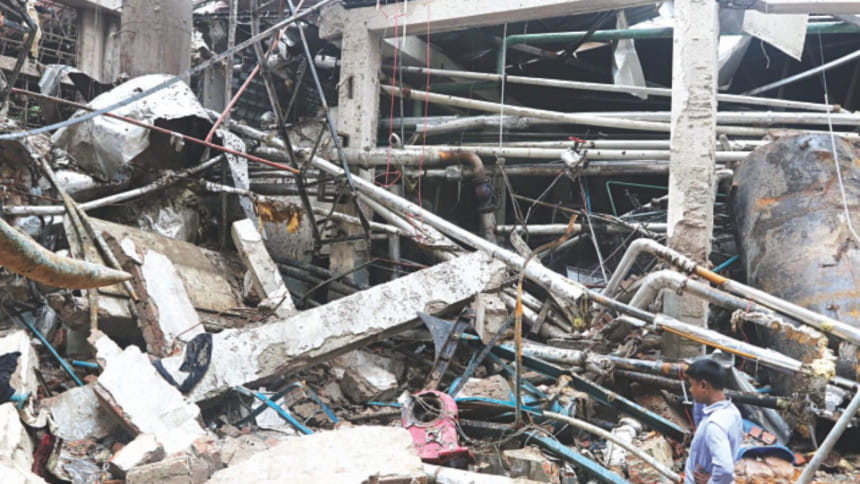Recipe for disaster

The death toll from Monday's boiler explosion rose to 13 yesterday, showing once again that boilers are becoming a major source of industrial disasters due to lack of proper inspection and use of outdated boilers.
The casualty could have been much higher if all sections of the garment factory of Multifabs Ltd in Kashimpur area were open at the time of explosion. Only a few sections were in operation on Monday evening, and the factory was supposed to reopen fully yesterday after the Eid vacation.
Mahiuddin Faruqui, chairman and managing director of Multifabs, told this newspaper that Multifabs purchased the boiler from a German company and installed it on the ground floor of the factory building in 2005.
He further said that he didn't feel it necessary to replace the boiler, as the lifespan of such equipment is more than 25 years.
Seeking anonymity, an official at the Office of Chief Inspector of Boilers, said the factory on June 19 applied for inspection of the boiler whose certified period expired on June 24.
“We have learnt that the boiler exploded because of excessive pressure and mishandling,” added the official.
Maj AKM Shakil Newaz, director of the Fire Service and Civil Defence, said no safety measures were taken at the place where the boiler was set up.
“An RCC [reinforced concrete] wall was supposed to be around the boiler as part of safety measures. But the wall around it was found to be weak,” Shakil said.
He suggested that the authorities engage experts to examine the building and find out whether it can be used after the explosion.
The fire service concluded the rescue operation yesterday evening, he said.
Talking to The Daily Star, State Minister for Labour Mujibul Haque Chunnu said it is obvious that there was negligence on the part of the factory authorities.
“The boiler's expiry date was June 24. Why did they operate it even after that?”
The minister said a case was filed over the boiler explosion and punitive action would be taken against those responsible.
Talking to The Daily Star, a number of officials at the chief inspector of boilers' office, a government agency under the industries ministry, said they are suffering from a huge manpower crisis and it's almost impossible for the inspectors to visit all the boilers every year.
At present, only six inspectors are designated to examine more than 5,000 authorised boilers across the country.
It usually takes an inspector a day to complete inspection of a boiler, which means it would take them 840 days to complete one round of inspection. And this doesn't include around 20,000 unauthorised boilers.
The agency is comprised of the chief inspector of boilers, a chief inspector, three deputy chief inspectors, and six inspectors -- three in Dhaka, two in Chittagong and the other for Khulna, Rajshahi and Rangpur regions.
Besides, there is a crisis of trained boiler operators in the country.
Earlier on April 19, at least 17 people were killed and 30 others injured in a boiler explosion at Jamuna Automatic Rice Mill in Dinajpur.
WITNESSES' ACCOUNTS
Joynal Abedin was transporting goods on a trolley on the third floor of the three-storey factory building on Monday evening.
Suddenly, there was a loud bang and the building started shaking. Plasters began falling from the ceiling and shards of glasses were all around.
Joynal then fainted.
When he regained consciousness, he found himself lying on a hospital bed with severe pain all over his body.
Labourer Ismail Hossain was working near the main factory gate at that time.
“I heard a loud bang, and then the place got covered in dust within moments. I could hardly see anything ... Then I ran to the nearby garment building,” said the 38-year-old man who was hit by shards of glass in legs.
He later phoned his brother who took him to a local hospital.
Ismail said there was not much open space on the factory compound.
“Many would have been killed if the garment factory was operating fully at the time of explosion.”
He said around 6,000 people, including staffers and labourers, work at the garment factory on a regular day. But on Monday evening, around 200 factory staffers and workers were there as most of the sections remained closed because of Eid.
Talking to this newspaper, Md Akhteruzzaman, deputy assistant director of the Fire Service and Civil Defence, said they recovered three more bodies from the debris yesterday evening.
“To my knowledge, nobody is missing,” he said.
The 13 dead are Salman Shah, Al-Amin Hossain, Mujibur Rahman, Biplob Chandra Shil, Mahbubur Rahman, Abdus Salam, Ershadullah, Monsur Ali, Nazrul Islam, Masud Rana, Amiruzzaman, Giasuddin and Arshad.
Additional Deputy Commissioner (revenue) of Gazipur Mahmud Hasan said they handed over six bodies to their families.
At least 51 people were wounded in the explosion.
Dr Khan Md Sharif, director of Konabari Sharif General Hospital Private Ltd, said that of the injured, 35 were under treatment at the hospital while the rest were treated at Konabari Clinic and Diagnostic Centre.
Meanwhile, the Fire Service and Civil Defence formed a three-member committee led by its assistant director to find out the reason behind the blast.
Multifabs Chairman and MD Faruqui claimed the Office of the Chief Inspector of Boilers inspected the boiler every year and that his factory was certified by the Accord, the inspection, remediation and monitoring agency of more than 200 European retailers and brands, in January this year.
In reply to an email from The Daily Star, Rob Wayss, Accord's executive director for Bangladesh operations, said Multifabs Ltd is an Accord-covered factory.
“It was initially inspected for fire safety on 9th April 2014.”
“On the day of the boiler explosion, 77 percent of the required fire safety remediation items had been verified by Accord as completed. 82 percent of the overall remediation items had been verified as completed,” Wayss said.
As per the Accord's fire safety inspection, boiler rooms at the factory needed to have fire separation system. The factory had completed this remediation and this was verified by the Accord engineers on 26 October 2016, he mentioned.
“Please note that the fire separation is to contain a fire in the event one occurs in the room the boiler is located. A fire separation (fire rated construction with fully protected and sealed opening) does not address the issue of a boiler explosion.
“The Accord will continue to work with the factory and our signatories to fully remediate the Multifab facility,” Wayss added.
Following the explosion, the management closed the factory for an indefinite period. Five other factories in the area were also shut.
The labour ministry will give Tk 5 lakh and the factory authorities Tk 3 lakh in compensation to each of the families of the dead.
[Our Gazipur Correspondent contributed to the report.]

 For all latest news, follow The Daily Star's Google News channel.
For all latest news, follow The Daily Star's Google News channel. 







Comments